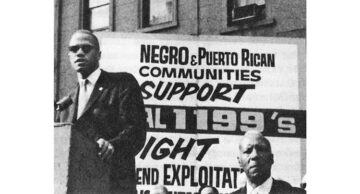Naomi Craine in The Militant:
 During the last year of his life, Malcolm organized and spoke with increasing clarity on questions that remain central for working people today.
During the last year of his life, Malcolm organized and spoke with increasing clarity on questions that remain central for working people today.
“I believe that there will ultimately be a clash between the oppressed and those that do the oppressing,” he told a television reporter in 1965. “I believe that there will be a clash between those who want freedom, justice, and equality for everyone and those who want to continue the systems of exploitation. I believe that there will be that kind of clash, but I don’t think that it will be based upon the color of the skin, as Elijah Muhammad had taught it.”
Malcolm acted on his conviction that the fight to end racial oppression here was part of the worldwide struggle against colonialism and imperialism. He met and worked with other revolutionaries, taking two extended trips to Africa and the Middle East. He was attracted to the workers and farmers governments that had come to power through popular revolutions in Algeria and Cuba.
He was drawn to work with the Socialist Workers Party in the U.S.
Speaking at a Militant Labor Forum in New York in May 1964, Malcolm pointed to the example set by the Chinese and Cuban revolutions, where the capitalists and landlords had been expropriated. In contrast, he said, “The system in this country cannot produce freedom for an Afro-American. It is impossible for this system, this economic system, this political system, this social system, this system, period.”
More here. (Note: In honor of Black History Month, at least one post will be devoted to its 2025 theme of “African Americans and Labor” throughout the month of February)
Enjoying the content on 3QD? Help keep us going by donating now.
